
Eugenia Choi's violin connects her to ecosystems in danger -
photo by Martin Dee UBC Reports | Vol. 55 | No. 3 | Mar.
5, 2009
Green Virtuoso
By Basil Waugh
What do polar bears and violins have in common? If you ask renowned concert violinist Eugenia Choi, she’ll tell you they are both endangered species.
Choi, a UBC assistant professor of music, recently traveled to the Arctic with scientists, CEOs and politicians – including members of the new Obama administration – to see the impacts of global warming. There, she saw first-hand the plight of polar bears.
But closer to home, you don’t have to look far for concrete examples of climate change, she says. Take her 300-year old, handcrafted Stradivarius violin. It’s not that they don’t make them like they used to, it’s that they can’t.
“For musicians, our instruments connect us to a natural world very much threatened by climate change,” Choi says. “People wonder why a fine violin can cost more than a house. Largely, it’s because global warming has changed how trees grow. You can no longer create new violins of the same quality. There just aren’t the same types of wood or density.”
“I feel a moral duty to protect these wonderful instruments so I use them to teach students about our relationship with environment,” says Choi, who received her doctorate in music from the Juilliard School in 2007. “As someone who cares passionately about music and nature, it is a great concern to me. That’s why I do what I do.”
And has she ever. Over the past four years, Choi has helped environmental non-profit organizations such as the U.S.-based Nature Conservancy raise nearly $1-million dollars for conservation through fundraisers, benefit concerts, grants and corporate development.
This spring, she will also perform a number of high-profile green benefit concerts, including the 2009 Aspen Environment Forum in late March and a New York City fundraiser for the Nature Conservancy in May, where she will play Vivaldi’s Four Seasons.
“Music can be a powerful vehicle for change,” says Choi, who joined UBC’s School of Music – one of Canada’s leading post-secondary music departments – in 2004. “It is a wonderful way to bring awareness to things that matter to you.”
She says it is often difficult for musicians to control every aspect of a busy international touring schedule, but she purchases carbon offsets to lighten her ecological footprint. In Vancouver, she uses public transit, supports green and socially responsible restaurants and businesses and maintains a portfolio of ethical investments.
Asked how musicians can advance dialogue around climate change, Choi points to her life-changing 10-day voyage to the Norwegian Arctic aboard the National Geographic vessel the Endeavor.
Invited by the National Geographic Society to represent the arts and youth, she rubbed shoulders with luminaries from the world of science, politics, business and culture – including former President Jimmy Carter, Chevy Chase, Colorado Gov. Bill Ritter and the CEOs of Google, DuPont and eBay.
For her, the turning point of the trip was when the unexpected happened: her hosts asked her to play outside.
“Classical musicians are indoor creatures, you have to remember,” she says of her impromptu performance on an Arctic rock ledge. “We perform in climate-controlled concerts halls on sensitive instruments, trying to get that perfect sound.”
But against the dramatic backdrop of an ecosystem in danger, she played a stirring Bach solo violin sonata to an audience of world leaders and media.
“After days of talking, this was finally a moment for people to really reflect,” says Choi, noting that the music and setting packed an emotional wallop, moving many to tears. “It was completely outside of my comfort zone, but I know it was the highlight of the trip for me and others.”
“If we’re going to tackle something like climate change, you really have to speak to both peoples’ hearts and minds,” Choi says. “Talking, that really works for the mind. But you need music to speak to the heart.”
Last year, UBC earned the top grade among Canadian post-secondary institutions and third overall in the annual College Sustainability Report Card, a survey of 300 North American universities and colleges’ sustainability activities.
For more information on Eugenia Choi visit:
www.eugeniachoi.com
Jimmy Carter’s trip report: www.cartercenter.org/news/trip_reports/arctic_July2008.html
UBC School of Music:
www.music.ubc.ca
UBC Sustainability:
www.sustain.ubc.ca |
